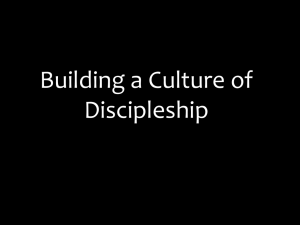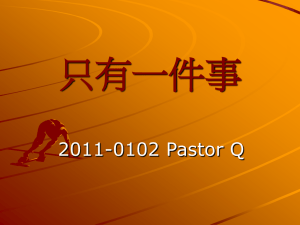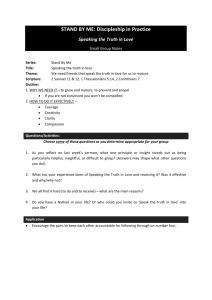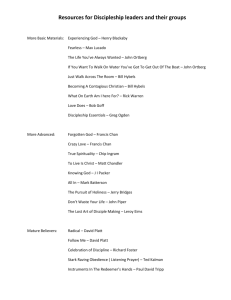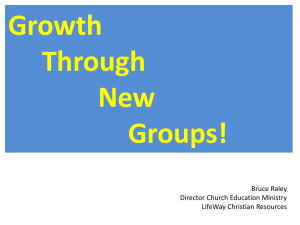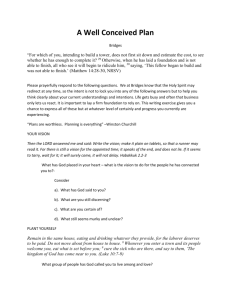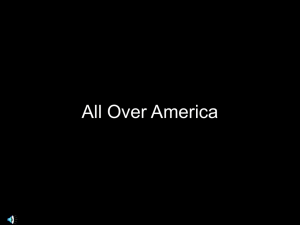Building a Disciple-Making Ministry
advertisement
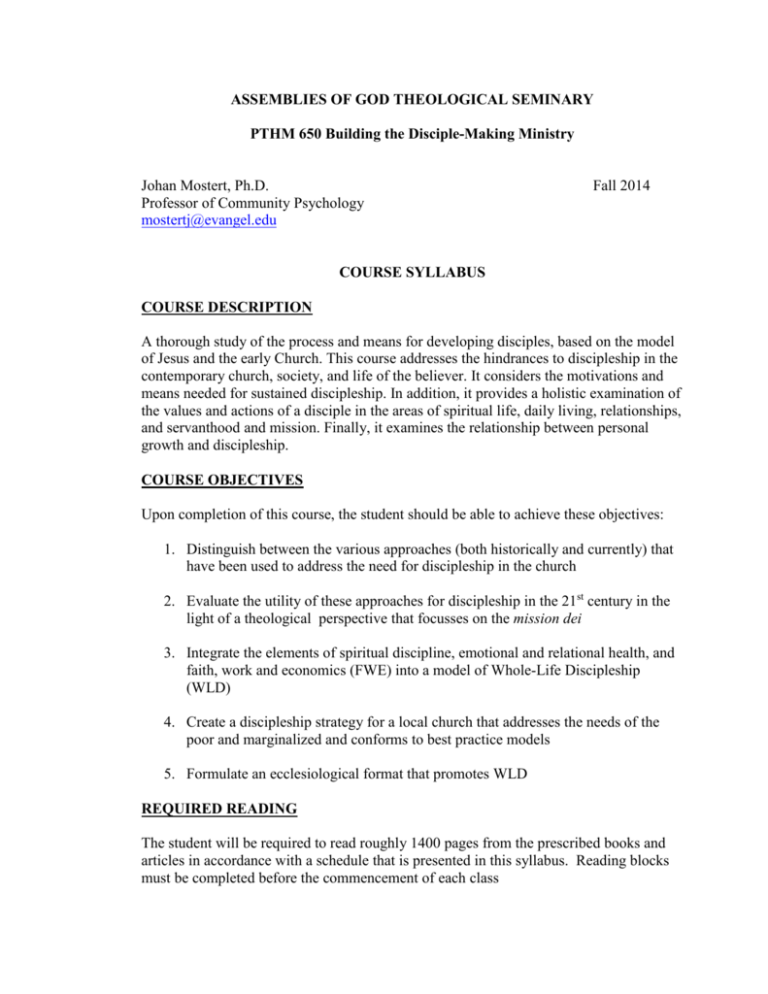
ASSEMBLIES OF GOD THEOLOGICAL SEMINARY PTHM 650 Building the Disciple-Making Ministry Johan Mostert, Ph.D. Professor of Community Psychology mostertj@evangel.edu Fall 2014 COURSE SYLLABUS COURSE DESCRIPTION A thorough study of the process and means for developing disciples, based on the model of Jesus and the early Church. This course addresses the hindrances to discipleship in the contemporary church, society, and life of the believer. It considers the motivations and means needed for sustained discipleship. In addition, it provides a holistic examination of the values and actions of a disciple in the areas of spiritual life, daily living, relationships, and servanthood and mission. Finally, it examines the relationship between personal growth and discipleship. COURSE OBJECTIVES Upon completion of this course, the student should be able to achieve these objectives: 1. Distinguish between the various approaches (both historically and currently) that have been used to address the need for discipleship in the church 2. Evaluate the utility of these approaches for discipleship in the 21st century in the light of a theological perspective that focusses on the mission dei 3. Integrate the elements of spiritual discipline, emotional and relational health, and faith, work and economics (FWE) into a model of Whole-Life Discipleship (WLD) 4. Create a discipleship strategy for a local church that addresses the needs of the poor and marginalized and conforms to best practice models 5. Formulate an ecclesiological format that promotes WLD REQUIRED READING The student will be required to read roughly 1400 pages from the prescribed books and articles in accordance with a schedule that is presented in this syllabus. Reading blocks must be completed before the commencement of each class Disciple-Making Ministry 2 J. Mostert Corbett & Fikkert (2014). When Helping Hurts. Moody Publishers Amazon: $11.98 Lim, S. (2012). Transforming Believers into Growing Disciples: Why Churches Don’t Disciple and how Yours Can. Available for $12 from the Faculty Secretary at AGTS. Mostert, J. (2014). Ministry of mercy and justice. Chapter in Ma, W., Karkkainen, VM., and Asamoah-Gyadu, J.K. (Eds.), Pentecostal mission and global Christianity. Regnum Books International, pp. 169-181. PDF file will be made available online. Nelson, Tom (2011). Work Matters: Connecting Sunday Worship to Monday Work. Crossway. Amazon: $13.15. Scazzero, Peter (2010). The Emotionally Healthy Church. Zondervan. Amazon: $15.15 Self, C. (2013). Flourishing churches and Communities: A Pentecostal Primer on Faith, Work, and Economics. Christian Library Press. Amazon: $9.00 Sherman, Amy (2011). Kingdom Calling. Downers Grove: IVP. Amazon: $13.69 Willard, Dallas (2006). The Great Omission: Reclaiming Jesus’s Essential Teachings on Discipleship. Harper One. Amazon: $11.99 METHODOLOGY This class will be presented in an experimental hybrid format. Students will spend only 51% of class time actually attending the class in-house. Some of the scheduled class periods will only meet half of the scheduled class time in-house while other class periods will be cancelled for only online activities. When students arrive for the first class period the expectations, procedures and schedules will be made available. We appreciate your cooperation in this experiment and would value your feedback as we attempt to move our theological educational offerings into a format to accommodate new learning styles of 21st century students COURSE OUTLINE The course will be divided into seven cognitive clusters. Some of these clusters will require more than one week of activity (in red). What follows below is an early attempt to define these clusters and to assign the readings that will be associated with each. Disciple-Making Ministry 3 J. Mostert 1. Introduction to Discipleship Theory a) Lim (2012) i) Chapter 1 (38pp): Ousting the elephant of non-discipleship ii) Chapter 2 (34pp): Replacing flawed paradigms b) History from first SPS paper c) List of discipleship SYSTEMS (Gill) 2. Missio dei a) Mostert (in Ma, 2014, 19pp) i) social justice vs. evangelism bifurcation debate ii) see quotes from Dick Brogden PhD 2014 graduation presentation b) Acton University video series: “For the life of the world: Letters to the Exiles” i) What is our salvation for? We’re to make something of the world ii) Elements (1) Love (2) Creation service (3) Order (4) Wisdom (5) Wonder c) Read Corbett & Fikkert (2014) pages 1 to 49, “Why did Jesus come to earth?” d) Sherman (2011) i) Chapter 1 what does a rejoiced city look like? ii) Chapter 2 what do the righteous look like? iii) Chapter 3 why we aren’t the righteous iv) Chapter 4 how the gospel of the Kingdom nurtures the righteous 3. Spiritual disciplines a) Lim (2012) Chapter 9 (34pp): Spiritual disciplines b) Willard (2006): pages 1 to 195 (esp. pp. 107 and 114) 4. Emotional health a) Scazzero (2010) i) Read p. 1 to 199 ii) P. 59-66 inventory of spiritual emotional maturity iii) Tend to the six principles of an emotionally healthy church b) Lim (2012) i) Chapter 3 (29pp): Personal issues ii) Chapter 4 (31pp): Cultural subversions c) Self (2013) Chapter 5 (11pp): Personal wholeness, relational integrity, and vocational clarity d) Sherman (2011) Chapter 8 formation: character 5. Theology of Work and Economics Disciple-Making Ministry 4 J. Mostert a) Nelson (2011, p. 1 to 201): Work matters b) Sherman (2011) i) Chapter 5 integrating faith and work ii) Chapter 6 inspiration: a theology of work iii) Chapter 7 discovery: more than spiritual gift inventory c) Self (2013, pp 1-68) i) Chapter 1 God’s Story ii) Chapter 2 Story of Creation: Includes the economy and work iii) Chapter 3 Story of Redemption: Living the future now iv) Chapter 4 Holy Spirit empowers transformation of the economy and society (FWE) 6. Changing the world a) Corbett & Fikkert (2014): Ministry to the poor and marginalized i) Chapter 2 Definition of poverty ii) Chapter 3 Poverty alleviation (p. 74), changing the worldview iii) Chapter 4 Relief, rehabilitation and development iv) Chapter 5 ABCD v) Chapter 6 Participation by the poor vi) Chapter 9 Grameen, micro-finance, BAM b) Sherman (2011) i) Chapter 9 deploying vocational power: four pathways ii) Chapter 10 bloom where you’re planted iii) Chapter 11donate your skills iv) Chapter 12 launch your own social enterprise v) Chapter 13 participate in your church’s targeted initiative 7. Ecclesiology a) Gill talks about Discipleship “systems”; b) Hull (2006, The complete book of discipleship) talks about “Models” (Appendix A: pp. 303-307) (like Barna, 2001, pp. 133-160) i) Competencies model ii) Missional model iii) Neighborhood model iv) Worldview model v) Lecture Lab Model vi) A “Best of” Model c) Corbett & Fikkert (2014) i) Chapter7 Short term missions ii) Chapter 8 in your backyard iii) Chapter 10 “spare change”? 5 principles to foster development at the local church level Disciple-Making Ministry 5 J. Mostert d) Self (2013) i) Chapter 6: The local church: Incubator of transformation ii) Chapter 7: The local church: Commissioned for impact in all domains e) Lim (2012) i) Chapter 5 (29pp): Sustaining motivation for discipleship ii) Chapter 6 (30pp): Growing through the circumstances of life iii) Chapter 7 (30pp): Preaching & teaching that make a difference iv) Chapter 8 (28pp): Creating Christian community that actually matters f) Mostert’s Dirty Dozen COURSE REQUIREMENTS As explained above this course will be an experimental course with a hybrid delivery system that will include both classroom interactions as well as online assignments. Although the full details of this hybrid approach is still to be worked out, we want to suggest that the course requirements will consist of the following elements: 1. Active participation during in-house class discussions (10% of grade) 2. Three online discussions and responses to peers 15% each (45%) 3. Whole Life Discipleship (WLD) self-assessment and journaling assignment during the second half of the semester (20% of grade) 4. WLD evaluative report and strategic planning document for future application (20% of grade) 5. Self-evaluation with respect to reading assignments (5%) SPECIFIC DATA Syllabus prepared by Johan Mostert, May 8, 2014. Due to the proposed experimental nature of this hybrid course, changes to this syllabus can be made before the commencement of the course, but required textbooks will not be affected by this provision. Data updated September 25, 2014.
